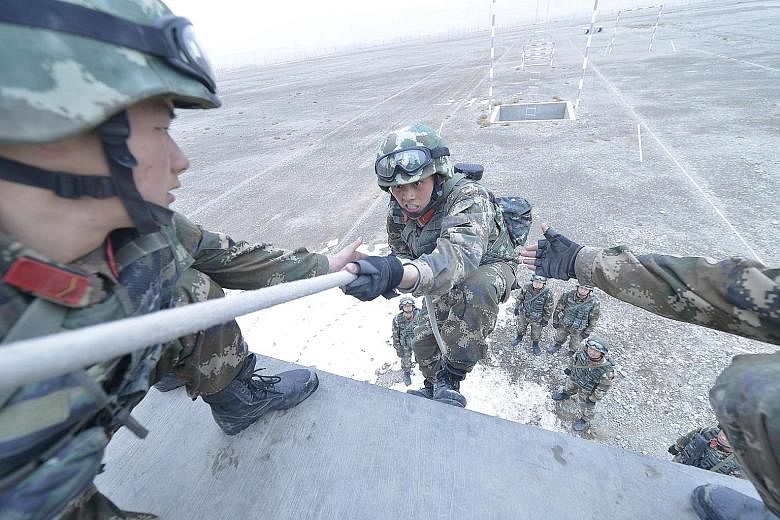Terror activities have dropped off significantly in the restive Xinjiang region, but the local government said it will continue a "high-pressure" security crackdown and other steps such as poverty alleviation, especially amid a slowing economy that might stir social unrest.
Speaking yesterday on the sidelines of the national legislature session, Xinjiang party boss Zhang Chunxian said the security situation has improved markedly, thanks to the region's economic growth, among other factors.
Xinjiang's economic growth, which ranked 29th out of China's 31 provinces in 2010, had climbed to eighth spot last year, with an 8.8 per cent growth rate that exceeded the national 6.9 per cent expansion.
"The situation in Xinjiang is becoming ever more stable. Local authorities have strengthened their ability to prevent and fight terrorist activity," Mr Zhang said, without providing figures or a timeframe.
But Xinjiang, with a population of about 23.6 million, continues to face complex challenges in fighting terrorism and maintaining social stability, "due to history, reality, international and domestic factors", said Mr Zhang, a Politburo member.
"We need to maintain a high-pressure clampdown on terror activities and extremism, while beefing up education work," he added during a meeting held by the region's officials to discuss Premier Li Keqiang's government work report.
In 2014, China was rocked by several terror attacks linked to Xinjiang unrest, such as a slashing attack in March at south-western Kunming's railway station that killed 29, and a suicide car crash in Xinjiang's capital city Urumqi in May that killed 31.
The key incident last year was an attack on Sept 18 by knife-wielding separatists that killed at least 50 people, reportedly mostly Han Chinese, at a coal mine in the Aksu area.
China has blamed the "terror attacks" on militants from overseas groups agitating for independence for local Muslim Uighurs who are disgruntled with perceived religious oppression, an influx of Han Chinese and unfair education and employment opportunities.
Xinjiang chairman Shohrat Zakir said a grassroots outreach campaign, which has seen 210,000 Xinjiang cadres living in towns and villages for a year since 2014, would continue. "It has helped us groom a large pool of locals who can help maintain social stability," he said.
Xinjiang vice-chairman Huang Wei said that some 60 initiatives this year would aim to prop up growth and employment and ensure stability.
Deputy party chief Che Jun said it will also step up border control and cooperation with other countries to prevent Xinjiang locals from joining overseas extremist groups and returning to China by exploiting a more relaxed passport policy.
The policy introduced in Xinjiang last August streamlines the approval process. It has been welcomed for soothing social discontent by being fairer to Uighurs, despite concerns that some might find it easier to join militant groups. "Everything has its pros and cons... We can't revert to the old policy and miss the bigger benefits," Mr Che added.

